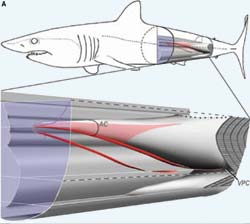IRD scientists have revealed, in an article just published in Nature, that the cooling event known in the Northern Hemisphere as the Younger Dryas (about 12 000 years B.P.) was expressed in the Pacific by the absence of any South Pacific Convergence Zone activity and the movement of tropical waters closer to the Equator. This observation shows the interaction which occurs between the low and high latitudes and provides boundaries relevant for building ocean-atmosphere climatic models. Geochemical ana
A “dead zone,” like the Stephen King novel of the same name, is a place where life can end. The horror meister probably wasn’t thinking about fish.
Dead zones are areas of the ocean where marine life – especially large quantities of fish – mysteriously die and where future marine life may never have a chance.
One well-known dead zone is near the Mississippi River delta area, where the nearby Sabine and Atchafalaya Rivers flow into southern Louisiana. Texas A&M University at G
A team of expert marine biologists and chemists has carried out research which proves for the first time that oceans and shores are contaminated with microscopic fragments and fibres of plastic.
Eight scientists from the Universities of Southampton and Plymouth and the Plymouth-based Sir Alister Hardy Foundation for Ocean Science have today (Friday 7 May) published their findings in the prestigious international journal Science.
The article ’Lost at Sea: Where Is All the Plasti
Hundreds of stretches of DNA may be so critical to life’s machinery that they have been “ultra-conserved” throughout hundreds of millions of years of evolution. Researchers have found precisely the same sequences in the genomes of humans, rats, and mice; sequences that are 95 to 99 percent identical to these can be found in the chicken and dog genomes, as well.
Most of these ultra-conserved regions do not appear to code for proteins, but may instead play a regulatory role. Evolutionary
Plankton appear to play a major role in regulating the global climate system, according to new research
David Siegel, professor of geography at the University of California, Santa Barbara, and director of the Institute for Computational Earth System Science, made the discovery with his former Ph.D. student Dierdre Toole, who is now based at Woods Hole Oceanographic Institute.
In an article in the May 6 issue of the journal Geophysical Research Letters, the scientists explai

Looks can be deceiving, the saying goes, and the same can be said of animals in the marine environment. To the casual observer, it would appear that the mighty great white shark and the common tuna don’t have a lot in common. In fact, just the opposite is true, according to new research led by scientists at Scripps Institution of Oceanography at the University of California, San Diego, and their colleagues in Germany.
In the first exploration of muscle dynamics in live lamnid sharks (a